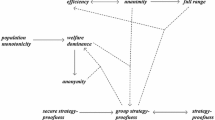Abstract
The paper investigates the structure of neutral and monotonic binary social decision rules with unrestricted domain under the assumption that individual weak preference relations are reflexive, connected, and quasi-transitive. Among other results, neutral and monotonic binary social decision rules on this domain are characterized for alternative social rationality assumptions.
Similar content being viewed by others
References
Armstrong, W. E. (1951): “Utility and the Theory of Welfare.”Oxford Economic Papers 3: 259–271.
Arrow, K. J. (1963):Social Choice and Individual Values, 2nd edn. New York: Wiley.
Blair, D. H., and Pollak, R. A. (1982): “Acyclic Collective Choice Rules.”Econometrica 50: 931–943.
Blau, J. H. (1957): “The Existence of Social Welfare Functions.”Econometrica 25: 302–313.
— (1972): “A Direct Proof of Arrow's Theorem.”Econometrica 40: 61–67.
— (1976): “Neutrality, Monotonicity and the Right of Veto: a Comment.”Econometrica 44: 603.
Blau, J. H., and Deb, R. (1977): “Social Decision Functions and Veto.”Econometrica 45: 871–879.
Gibbard, A. (1969): “Intransitive Social Indifference and the Arrow Dilemma.” Unpublished manuscript.
Guha, A. S. (1972): “Neutrality, Monotonicity and the Right of Veto.”Econometrica 40: 821–826.
Hansson, B. (1969): “Group Preferences.”Econometrica 37: 50–54.
Jain, S. K. (1988): “Characterization of Monotonicity and Neutrality for Binary Paretian Social Decision Rules.”Mathematical Social Sciences 15: 307–312.
Pattanaik, P. K. (1971):Voting and Collective Choice. Cambridge: Cambridge University Press.
Sen, A. K. (1970):Collective Choice and Social Welfare. San Francisco: Holden-Day.
Wilson, R. B. (1972): “The Game Theoretic Structure of Arrow's General Possibility Theorem.”Journal of Economic Theory 5: 14–20.
Author information
Authors and Affiliations
Rights and permissions
About this article
Cite this article
Jain, S.K. Structure of neutral and monotonic binary social decision rules with quasi-transitive individual preferences. Zeitschr. f. Nationalökonomie 64, 195–212 (1996). https://doi.org/10.1007/BF01250115
Received:
Revised:
Issue Date:
DOI: https://doi.org/10.1007/BF01250115



